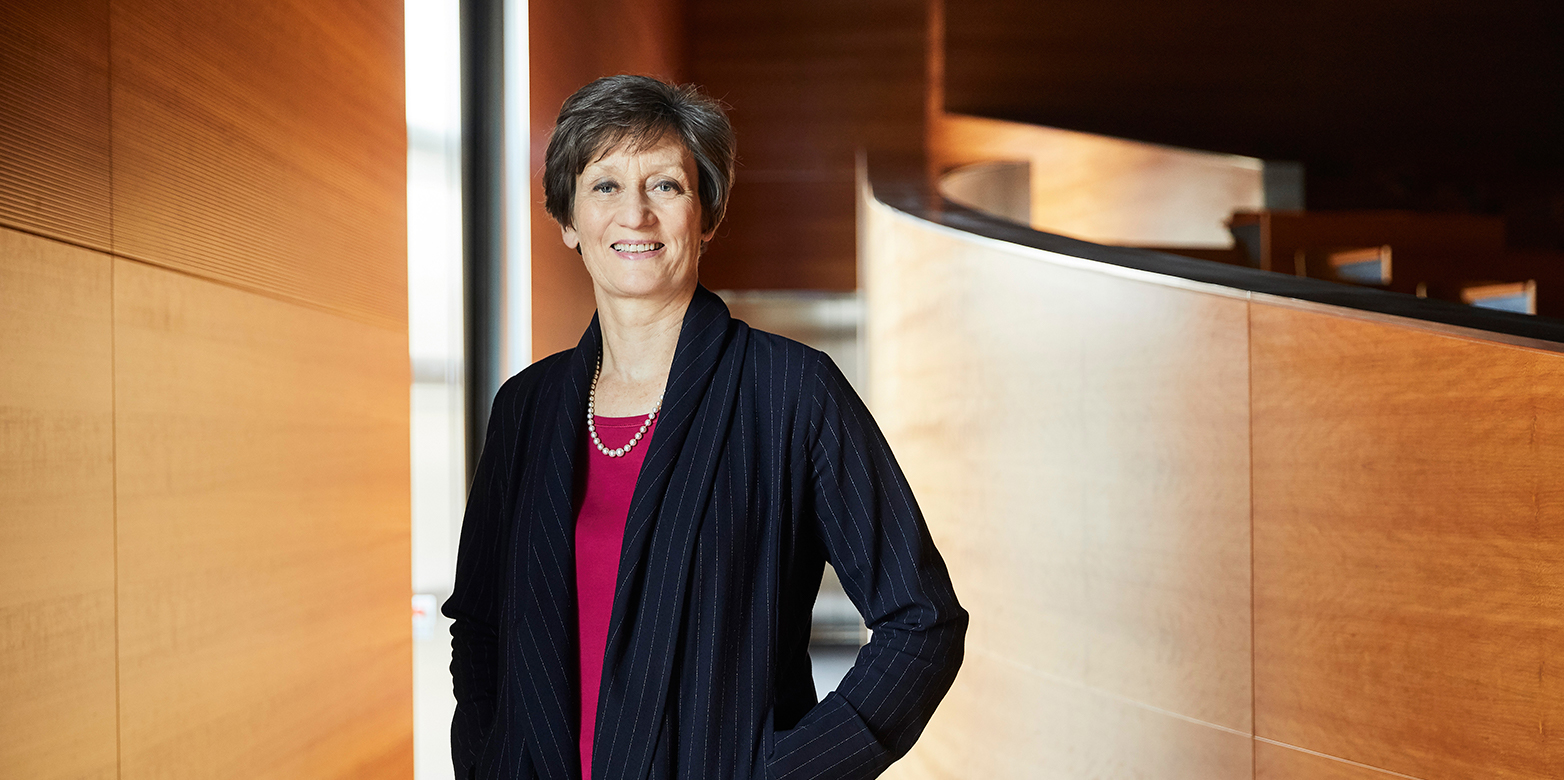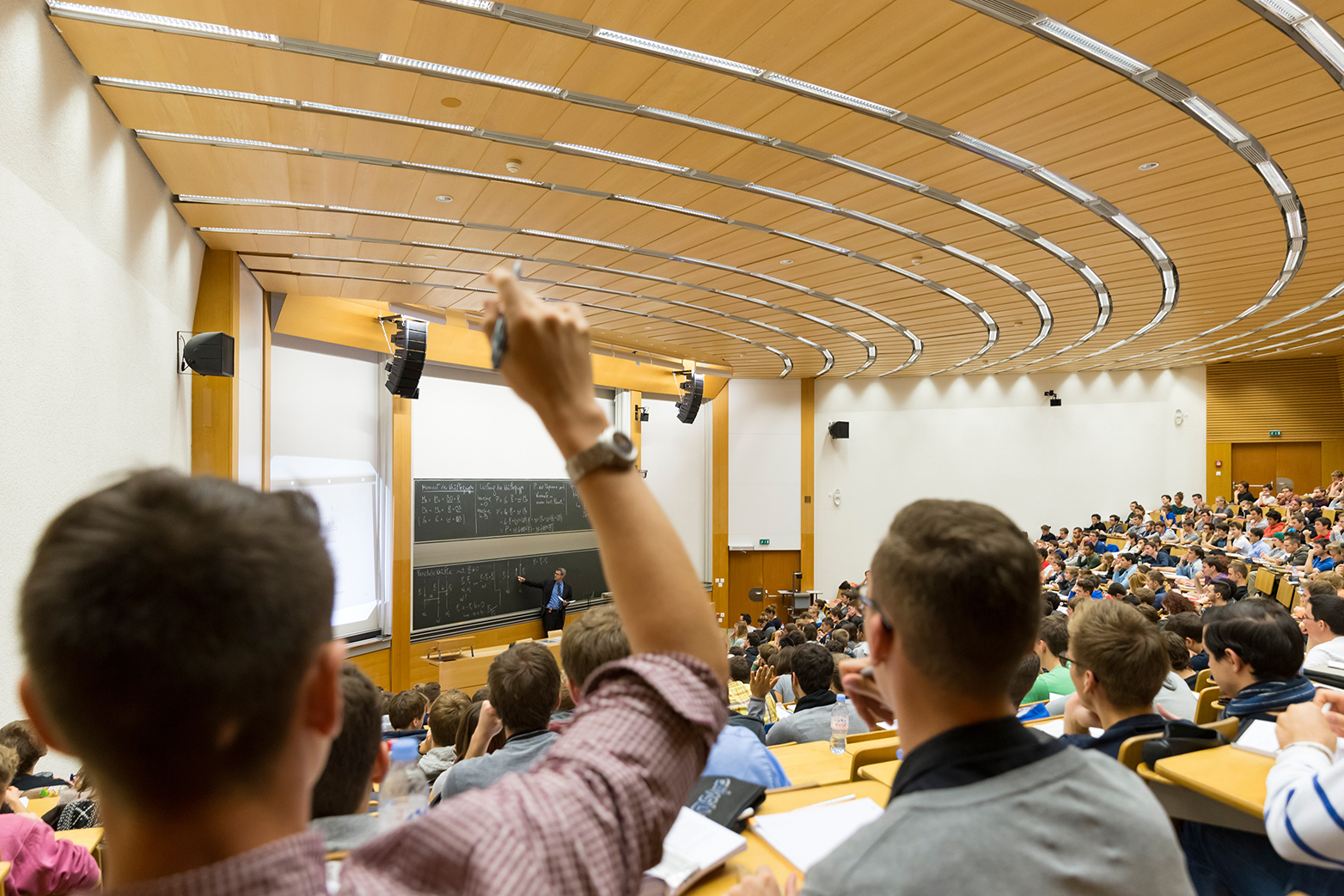"We are aiming for an optimal mix of classroom and online teaching"
The switch to online teaching last semester has worked incredibly well at ETH. But what form will teaching take in the autumn? Rector Sarah Springman discusses some of the arrangements that the university is currently considering.

Professor Springman, will students be able to return to ETH classrooms and lecture halls in the Autumn Semester?
We are doing our best to ensure that a large proportion of teaching can take place in classrooms and auditoria in the upcoming Autumn Semester. We haven’t finished the detailed planning, there are still a lot of open questions. But we have worked closely with the academic departments and other areas of the university – professors, assistants, students, and administrative, technical and scientific staff – to map out the direction we want to take. Our decisions have also been influenced by the results of the survey that 60% of lecturers responded to, asking them where they see the main focal points of classroom teaching in the coming semester. And of course, we engaged more intensively with the representatives of our students and assistants to obtain their feedback. The general consensus has always been that we want as many students as possible to begin their semester at ETH in September, despite the necessary limitations. In addition, every student should be able to complete part of their studies on campus over the course of the semester.
What were the main factors influencing your decisions?
The health of our students is our absolute priority. Here I'm not just talking about physical health, but their mental and emotional well-being: we must avoid a situation where students suffer from extended social isolation. Pedagogical aspects are important as well. Although the majority of teaching material can be delivered online, direct contact between students and lecturers, and exchanges between students themselves, are crucial for the learning process. After all, it is classroom teaching that makes the quality of education at our university so exceptional. Last but not least, we need to make allowances for the limited space available for teaching, in view of the unique circumstances.
What specific impact do the restrictions caused by the coronavirus have on planning for the coming semester?
The biggest impact is uncertainty. Our planning is based on the guidelines that are currently in force, although they do allow a certain amount of room for interpretation. As everyone knows, these rules can change again at any time –should Switzerland be hit by a second wave of infection, for example. This requires a great deal of flexibility for all parties involved. We've already shown we're capable of that in the last semester, when our lecturers and students switched to online teaching practically overnight. Our planning is currently based on the assumption that around half of the normal lecture hall capacity will be available: in other words, every other seat will be left vacant. We can create the necessary space by holding large lectures online and using rooms mainly for smaller gatherings and practicals. We are preparing for a semester where the focus will be on "blended learning", aiming for an optimal mix of online and classroom teaching. Here we can benefit from our extensive experience in this area. We can still have direct contact between lecturers and students by creating opportunities for voluntary classroom gatherings during off-peak periods.
Going back to the lecture halls: is it really possible to maintain physical distancing in the auditoria?
If we apply the two-metre distance rule to lecture halls, capacity would be reduced to a fifth or even less. This would make person-person teaching impractical. There are also issues relating to specific buildings, particularly aspects concerning the different ventilation systems. However, we are confident that through the use of surgical masks, modified building arrangements and intensive and frequent cleaning of our rooms, we can give students the level of protection the government recommends. As is generally the case in Switzerland, I am sure that we will find an effective and practical solution.
Will students be required to wear facemasks?
Making facemasks compulsory is an alternative, if it would allow classroom teaching to go ahead. At the moment, however, I am unable to give you a definite ruling on the wearing of facemasks. It's also important to see the effects that the latest measures taken by the government to ease the lockdown have on the rate of new infections in Switzerland. Many factors play a role here: most students travel to campus by public transport. Furthermore, they do not simply stay at home during their free time: they go to the cinema, restaurant or even the occasional party. So the clear guidelines set by ETH will be helpful here: they remind students to be aware of the risks and behave accordingly. For example, it is absolutely essential that anyone suffering from a cold, fever or other symptoms does not attend any teaching events on campus. On top of that, all students are actively encouraged to use the SwissCovid tracing app.
You mention contact tracing: what's your thinking on that?
It allows us to know exactly who is registered for the teaching events. Contact tracing also plays a key role in our approach to organising exercise groups, especially in the first year.
Why in the first year especially?
Let me elaborate: the first year is normally the most difficult for students, as that's when the selection process takes place. This first year is crucial for deciding whether they are on track to achieving their BSc or have to leave. Research by ETH has shown that students' social networks have a significant influence on academic success. In normal years, students already make initial contacts during pre-study events, and these often develop into study groups or friendships that continue right through university and even beyond. We think it's important for them to be able to interact with each other to encourage meaningful association between first-year students. In order to provide the same opportunities this year, we came up with the idea of splitting them into groups of around two dozen students each, who then complete the exercises together, across all subjects. This allows study groups to be formed that do not have to observe the rules on physical distancing as strictly, because we can quickly inform other group members as soon as anyone presents symptoms.
All these arrangements sound laudable, but there are also some students who are particularly vulnerable. What precautions will be in place for them?
Our goal is that all lectures delivered in the classroom or auditorium will be recorded and made available to enrolled students within a short period. This will allow not only students in a risk group, but all others, to follow and engage with the teaching. It will also result in reduced occupancy rates in our lecture halls. All the teaching materials will also be available online for exercise groups, even in the first year. Facemasks will be required when attending practicals, laboratory sessions and other events, where a physical presence is necessary and where it is impossible to comply with rules on physical distancing.
So far we have only discussed the general direction. But who decides which specific events take place and in what format?
We have already been working very closely with the academic departments to ensure that the available capacities for classroom teaching are utilised as efficiently as possible. This has resulted in the general direction I described earlier, which the Rectorate is now advocating. Given the special importance of the first year, we are planning the relevant exercises centrally within Academic Services. The planning of other teaching events will be done by the academic departments, and specifically by the individual degree programmes and lecturers, based on their expertise in their areas. They know best the type of event for which classroom teaching is essential or would deliver the maximum benefit. The flexibility I mentioned above is important here, although the Rectorate will coordinate and support the planning process. Depending on how the pandemic progresses, we may need to revert to online teaching overnight or – in the best-case scenario – we may be able to continue to step up classroom teaching.
Can you already tell us when the detailed plans for room occupancy will be available and when students will be informed?
We are currently working flat-out to adapt the Course Catalogue to the new circumstances. Any changes to the degree programmes will then be gradually phased in during July, so that we expect to be able to publish the new and final version of the Course Catalogue at the start of August and begin enrolment for the Autumn Semester 2020.
One last question about a group that we haven't mentioned yet: international students. What is the situation in their case?
Students from Europe will be able to start the semester as normal now that the Swiss government has decided to open the borders with these countries. Of course, this is always provided there is no increase in the infection rate before the autumn. Students from other countries, who hold a residence permit, will also be able to enter Switzerland. Anyone without a permit will have to wait for the immigration office to deal with their case: I appreciate this situation is unsatisfactory, but there's nothing we can do to change it. We are currently exploring alternative solutions with other universities. Completing an entire semester purely online is impossible due to the practicals and laboratory exercises that have to be done on campus. I feel sorry for all those affected. We are making an exception, however: anyone who has already been admitted to a masters’ course in the Autumn Semester 2020 may defer their entry for a year.

Comments
No comments yet